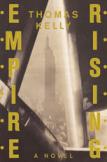A Storied Story
New York City, in the year 1930, was simultaneously ascending and descending. Its most ambitious project was the building of the world’s tallest skyscraper, unashamedly called the Empire State Building, right in the heart of busy Manhattan. Meanwhile, its descent was less evident: the stock market had collapsed, rallied, collapsed again; the Great Depression was yet to bottom out but would do so soon; its disruptions would unearth subterranean political corruption at Tammany Hall and Mayor Jimmy Walker’s “office”; the decade-old experiment with prohibition had brought to pass the emergence of a now well-organized Italian Mafia, displacing from power the Irish and Jewish gangster elite.
Thomas Kelly has vividly recreated and reinhabited this New York of 1930, with all its multiple conflicts and entanglements, in his latest outstanding novel, Empire Rising. The canvas is epic in scale, peopled with numerous arresting characters, recognizable in both senses: “real” persons like Jimmy Walker, Babe Ruth, Primo Carnera, the famously “missing” Judge Crater and the many engaging but no less real inventions of his own. His special gift as a novelist is his ability to maintain a galloping tilt of narrative suspense, despite countless shifts in plot development, without overwhelming or confusing the reader. Unusual in an epic, to say the least, this novel is a page-turner; there is no plot-padding or authorial longueurs slackening the pace, and when surprising events happen (as they continually do), they do so plausibly, with a sense of rightness for the reader (yes, that is what so-and-so would do, no matter how unexpected).
The low-life characters and settings in Kelly’s novels might mislead prospective readers into thinking that here is but another lurid offering of slash-and-burn escapist fare. Not so. First, a moral heartbeat animates the narrative, an unobtrusive ethical reckoning present throughout, which led one reviewer to call him “a Dostoevsky with a hard hat and a lead pipe.” Second, here a serious artist employs the usual conventions proper to the thriller and elevates them without apology or condescension.
The title, for example, is a metaphoric clue to the reader about the story’s structure. Like the building of the Empire State, the underground of grit and sediment needs exposure and gouging (badly, given the city’s corruption); after this a foundation is laid that will support the separate stories, each layer only seeming separate but actually interconnected and mutually supportive (so the reader discovers); as the many “stories” ascend, there is as yet no facade—all is exposed, and the reader is offered alternative views (the traffic of life in the Bronx and Brooklyn, for instance). Gradually, the reader appreciates the sturdy beams buttressing the design: a marvelous ear for dialogue, especially among the common folk; a sly wit assessing the action; a rich appreciation of the manual skills, sheer courage, as well as camaraderie needed by high-rise construction workers, reflecting Kelly’s previous life as a sandhog and construction laborer.
Complementing such careful architecture is the narrative’s pivot: a tender love story between two people who are at once participants and onlookers. One of the construction workers is Michael Briody, a recent Irish immigrant and former assassin for the Irish Republican Army, who is anxious for a new start in America. He meets Grace Masterson, a talented sketch artist, who is the mistress of the odious Johnny Farrell, the bagman for Mayor Walker and his liaison with the underworld. Both are ardent and even idealistic, but trapped by circumstance and commitment. As most lovers discover in dismay, the world—especially the treacherous, unfeeling worlds these characters inhabit—goes on, willy nilly, oblivious of their ardors and aspirations.
A reviewer of Kelly’s terrific last novel, The Rackets (2001), offered this simple summation: “This is historic fiction writing at its very best.” Ditto for Empire Rising.
This article also appeared in print, under the headline “A Storied Story,” in the May 2, 2005, issue.








